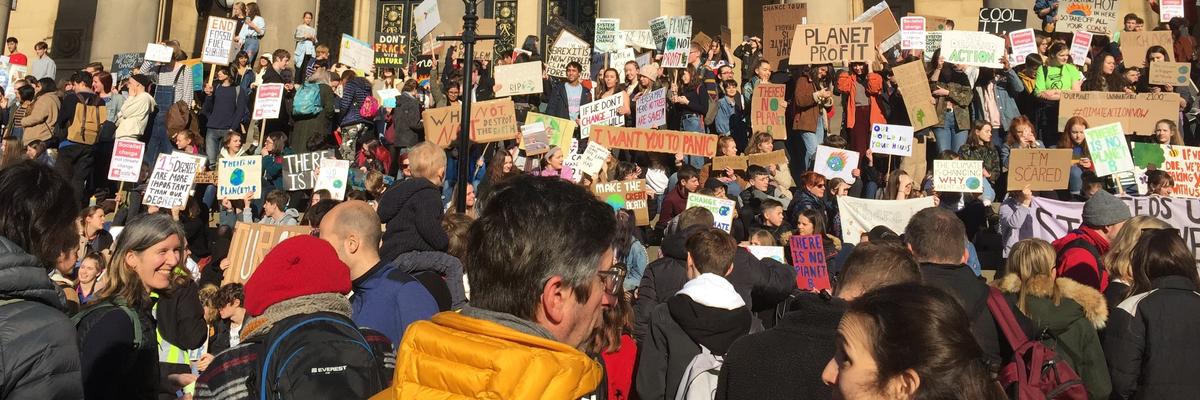Commentary
Briony Latter
25 June 2021
The past two years have seen a sustained and high level of publicity around climate change in the UK, with the concept of climate change as an emergency becoming mainstream. One way this has manifested has been the use of climate emergency declarations, for example by organisations and individuals in different sectors (i.e. culture and music), local governments and universities. In new research by myself and Dr Stuart Capstick, we analysed 37 declarations by UK universities in order to understand how they are responding to, and positioning themselves in relation to climate change.
Whilst a wide range of organisations have used declarations, we focused on universities as part of the Centre for Climate Change and Social Transformations’ (CAST) research around how transformation can be embedded within society. Universities can play an important role in tackling climate change, not only through research and education, but also through addressing their own carbon emissions. However, the scale and nature of change needed to tackle their emissions is substantial.
The first climate emergency declaration by a UK university came from the University of Bristol in April 2019. Over the next year another 36 followed suit. Universities’ climate emergency declarations offer a chance to see what image they are trying to portray publicly and what their intentions are at a time when climate change was (and still is, despite COVID-19) particularly visible and of high public concern.
How did universities use the declarations?
We found that universities tended to use the declarations as publicity and promotion, detracting from new commitments and action. They could have used the declarations to consider the role of universities in tackling climate change and the transformation required to do so. Instead, the declarations were more concerned with promotion.
There are multiple ways in which the climate emergency declarations can be seen to be promotional, such as focusing on previous or ongoing work over future plans. This included universities talking about launching sustainability institutes and the number of climate-related publications they have produced. The declarations showcase achievements on climate change and wider sustainability issues within the universities themselves, such as action they have taken to reduce plastic use, source renewable energy and install charging points for electric cars.
This promotional aspect was also demonstrated through leadership (often in an international context), in the form of awards, rankings, expertise and being the best or first at something. While these achievements are important and give a good indication of the extent to which universities are addressing climate change, it is questionable whether this should be the focus of the declarations.
Though much of the wording in the declarations is promotional, many do include action-oriented statements. Universities show a commitment to tackling climate change in tangible ways such as policies, targets and committees, but more transformative change was rarely touched upon. These commitments legitimise and provide ways for the universities’ actions to be scrutinised in future.
Despite an element of competition between universities brought about by the focus on leadership, we found that the declarations are also used to show universities as part of a bigger whole and that the climate emergency is a shared problem. The universities appear keen to demonstrate that other organisations have already declared a climate emergency, giving more legitimacy to their declarations by showing they are part of a wider initiative.
Staff and students are positioned as key collaborators and activists in relation to the universities’ climate work. External stakeholders such as councils and the local community are mentioned, but to a lesser extent and depth. Despite these being public documents, the primary audience appears to be internal stakeholders, given staff and students are likely to pay close attention to how their university is responding to climate change.
How do universities and local governments compare?
Whilst we focused on universities, PCAN has looked at the use of climate emergency declarations by local governments. Interestingly, there appear to be many similarities between them. Declarations by both universities and local governments seem to be concentrated in the spring, summer and early autumn of 2019, with the number of declarations decreasing significantly after that. Some universities and councils declared climate and ecological emergencies, and both used the declarations to publicly acknowledge the severity of climate change.
However, there are also some notable differences. Thirty-seven UK universities declared a climate emergency in the first year; less than 25% of the total number of UK universities (though more have declared since). A much higher percentage of local governments across the UK have declared climate emergencies (almost 75%) compared to universities. This perhaps suggests a difference in how universities see their role in society, compared to local governments, or the extent to which they feel climate change and broader environmental issues are directly within their control.
Additionally, whilst our research didn’t specifically look at this topic, it appears that many local governments (62%) have taken further action to a greater extent than universities in updating or creating new climate action plans. However, there have been further steps taken by some universities. Examples include the creation of a White Paper by the University of Exeter that recommends new carbon reduction targets and changes to infrastructure, strategy and culture, and a Climate Action Plan from Newcastle University that outlines a ten-point plan to meet their carbon targets and tackle climate change.
In our paper we argue that the absence of a declaration does not by extension indicate that no action is being taken (a point made by PCAN in its Trends in Local Climate Action in the UK report). Conversely, further action will not necessarily follow a declaration being made. We conclude, in a similar vein to that of PCAN, that it remains to be seen what impact the declarations will have, over and above action that universities were already taking on climate change. Declarations should provide a basis for taking further action, rather than being a goal in and of themselves.
Briony Latter is a PhD researcher at the Centre for Climate Change and Social Transformations (CAST), Cardiff University
Photo: Kate Lock




